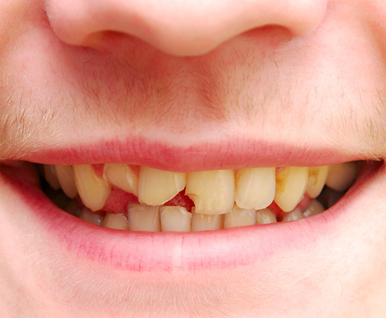-

Opening Hours
view our working time
-
Call us: +91 4936208777
+919562488777
Broken Teeth
Teeth are remarkably strong, but they can chip, crack (fracture) or break. This can happen in several ways. When a tooth chips or breaks, it may not hurt. However, your tongue usually feels the sharp area quite quickly. Minor tooth fractures usually don't cause pain, but if a large piece of the tooth breaks off, it can hurt. That's because the nerve inside the tooth may be damaged. If it is exposed to air, or hot or cold foods or drinks, it can be extremely uncomfortable.
Pain from a broken or cracked tooth may be constant or may come and go. Many people feel pain when they chew because chewing puts pressure on the tooth.

Reasons for broken teeth
- Biting down on something hard
- Being hit in the face or mouth
- Falling
- Having cavities that weaken the tooth
How an untreated broken teeth affect my Life
A chipped tooth can be a source of immense problem to you if it is left untreated. Teeth are made of very hard material, but improper use can cause them to chip and crack. If you eat foods that are very hard, such as corn kernels or ice, one wrong bite can cause your tooth to chipOur Medical director Dr. Sam Paul says that people have a tendency to ignore this problem as being very minor. However, in actuality it can easily escalate to a bigger problem.
chip in a tooth means that the enamel covering of the tooth has been broken which indicates a breach of the tooth’s security. It will certainly lead to tooth decay because it is impossible to clean a tooth properly from inside once it is chipped. The crack in the enamel allows disease causing bacteria to enter the tooth and cause decay from inside. After a while, the tooth will become infected and this could lead to eventual loss of the tooth if the problem is not addressed in time.
Treatment available for broken teeth
There are several types of tooth fractures and breaks, each of which requires different treatments. These include:
-
Minor cracks
Also called "craze lines," these are surface cracks that affect only the outer white surface of the tooth, called the enamel. Minor cracks rarely need treatment. However, your dentist may lightly polish the area to smooth out any rough spots. -
Cracked tooth
This type of fracture involves the whole tooth, from the chewing surface all the way down to the nerve. The pieces remain in place, but the crack gradually spreads. Cracks can sometimes be repaired with filling material. The tooth often will need a crown to prevent the crack from getting worse. If the pulp (nerve and other live tissues) is damaged, you may need a root canal as well. -
Chips
Minor chips don't always need treatment. Your dentist may suggest repairing the damage with filling material to prevent it from getting worse or to make the tooth look and feel better. If the chip is very small, the dentist may polish and smooth out the chipped area. -
Serious breaks
These breaks go deep enough to expose the nerve. They almost always cause the tooth to hurt and be sensitive. Usually, the broken part of the tooth will bleed. You will need root canal treatment to remove the exposed nerve and probably a crown to restore the tooth to normal function so you can eat and chew properly. -
Split tooth
This means that the tooth has split vertically into two separate parts. Some teeth, such as your back teeth (molars), have more than one root. It may be possible to keep one of the roots, which will then be covered with a crown. First, you will need root canal treatment. Second, the dentist will remove any roots that cannot be kept. Third, you will need a crown to cover the root and replace the tooth. In some cases, when a root cannot be saved, the tooth will have to be removed. -
Vertical breaks or split root
These cracks start in the root of the tooth and extend upward toward the chewing surface. These breaks are often painful because the area around the root may be inflamed or infected. In most cases, the tooth will have to be removed. -
Decay-induced break
In this case, the tooth has broken or crumbled because a cavity weakened it from the inside out. Your dentist will evaluate the cavity and recommend the best way to restore the tooth. In some cases, if the decay is extensive and goes down to the bone, the tooth may have to be removed.

